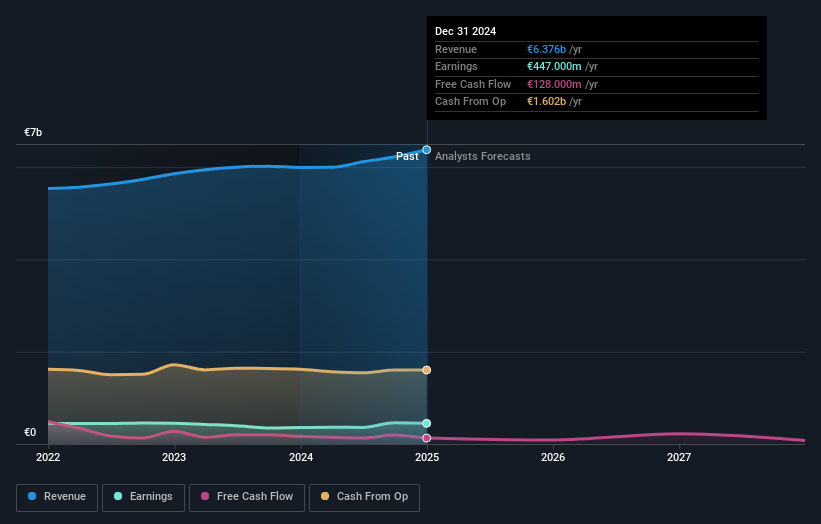- Belgium
- /
- Telecom Services and Carriers
- /
- ENXTBR:PROX
Proximus PLC's (EBR:PROX) stock price dropped 3.1% last week; sovereign wealth funds would not be happy

Key Insights
- Significant control over Proximus by sovereign wealth funds implies that the general public has more power to influence management and governance-related decisions
- The largest shareholder of the company is Federal Holding and Investment Company with a 56% stake
- 15% of Proximus is held by Institutions
To get a sense of who is truly in control of Proximus PLC (EBR:PROX), it is important to understand the ownership structure of the business. With 56% stake, sovereign wealth funds possess the maximum shares in the company. That is, the group stands to benefit the most if the stock rises (or lose the most if there is a downturn).
And last week, sovereign wealth funds endured the biggest losses as the stock fell by 3.1%.
Let's delve deeper into each type of owner of Proximus, beginning with the chart below.
View our latest analysis for Proximus

What Does The Institutional Ownership Tell Us About Proximus?
Institutional investors commonly compare their own returns to the returns of a commonly followed index. So they generally do consider buying larger companies that are included in the relevant benchmark index.
As you can see, institutional investors have a fair amount of stake in Proximus. This implies the analysts working for those institutions have looked at the stock and they like it. But just like anyone else, they could be wrong. If multiple institutions change their view on a stock at the same time, you could see the share price drop fast. It's therefore worth looking at Proximus' earnings history below. Of course, the future is what really matters.

Proximus is not owned by hedge funds. Looking at our data, we can see that the largest shareholder is Federal Holding and Investment Company with 56% of shares outstanding. With such a huge stake in the ownership, we infer that they have significant control of the future of the company. For context, the second largest shareholder holds about 2.7% of the shares outstanding, followed by an ownership of 2.1% by the third-largest shareholder.
Researching institutional ownership is a good way to gauge and filter a stock's expected performance. The same can be achieved by studying analyst sentiments. There are a reasonable number of analysts covering the stock, so it might be useful to find out their aggregate view on the future.
Insider Ownership Of Proximus
While the precise definition of an insider can be subjective, almost everyone considers board members to be insiders. Company management run the business, but the CEO will answer to the board, even if he or she is a member of it.
I generally consider insider ownership to be a good thing. However, on some occasions it makes it more difficult for other shareholders to hold the board accountable for decisions.
Our data cannot confirm that board members are holding shares personally. It is unusual not to have at least some personal holdings by board members, so our data might be flawed. A good next step would be to check how much the CEO is paid.
General Public Ownership
With a 29% ownership, the general public, mostly comprising of individual investors, have some degree of sway over Proximus. This size of ownership, while considerable, may not be enough to change company policy if the decision is not in sync with other large shareholders.
Next Steps:
It's always worth thinking about the different groups who own shares in a company. But to understand Proximus better, we need to consider many other factors. To that end, you should learn about the 3 warning signs we've spotted with Proximus (including 1 which can't be ignored) .
Ultimately the future is most important. You can access this free report on analyst forecasts for the company.
NB: Figures in this article are calculated using data from the last twelve months, which refer to the 12-month period ending on the last date of the month the financial statement is dated. This may not be consistent with full year annual report figures.
New: Manage All Your Stock Portfolios in One Place
We've created the ultimate portfolio companion for stock investors, and it's free.
• Connect an unlimited number of Portfolios and see your total in one currency
• Be alerted to new Warning Signs or Risks via email or mobile
• Track the Fair Value of your stocks
Have feedback on this article? Concerned about the content? Get in touch with us directly. Alternatively, email editorial-team (at) simplywallst.com.
This article by Simply Wall St is general in nature. We provide commentary based on historical data and analyst forecasts only using an unbiased methodology and our articles are not intended to be financial advice. It does not constitute a recommendation to buy or sell any stock, and does not take account of your objectives, or your financial situation. We aim to bring you long-term focused analysis driven by fundamental data. Note that our analysis may not factor in the latest price-sensitive company announcements or qualitative material. Simply Wall St has no position in any stocks mentioned.
About ENXTBR:PROX
Proximus
Provides digital services and communication solutions in Belgium and internationally.
Undervalued with proven track record and pays a dividend.
Similar Companies
Market Insights
Community Narratives



